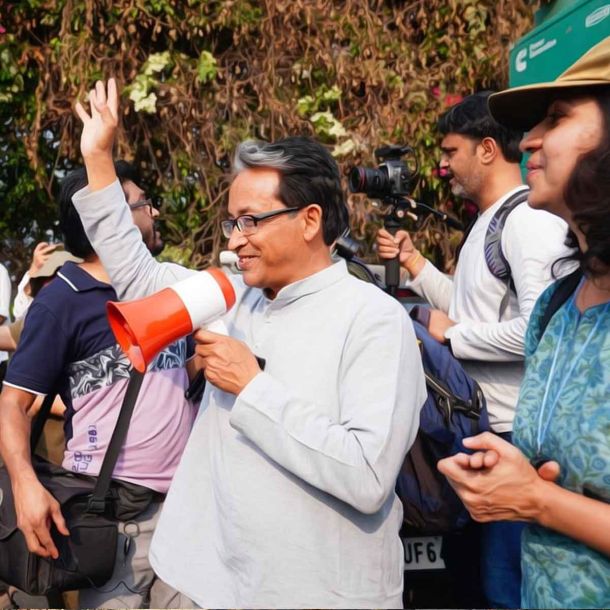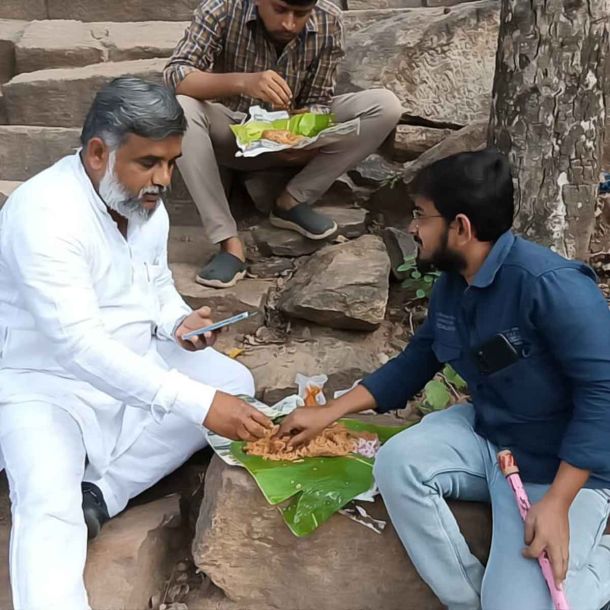MORE COVERAGE
Twitter Coverage
Satyaagrah
Written on
Satyaagrah
Written on
Satyaagrah
Written on
Satyaagrah
Written on
Satyaagrah
Written on
JOIN SATYAAGRAH SOCIAL MEDIA
In a decisive crackdown, UP's STF arrests Javed Shaikh and Majid, seizing 4 IEDs, uncovering a sinister plot linked to 2013's Muzaffarnagar riots; ties to Imrana revealed, intricate bomb-making skills from familial legacy & a network spanning borders

In a significant operation on the morning of February 16, the Special Task Force (STF) of Uttar Pradesh displayed exceptional vigilance and skill by arresting two individuals, Javed Shaikh and his associate Majid, in Muzaffarnagar. This arrest was not just any routine operation; it potentially saved countless lives. The STF, acting on precise intelligence, intercepted these two in the Khalapar area, a detail that underscores the meticulous planning and execution of the operation.
|
What makes this arrest particularly alarming is the recovery of four time bombs from Javed and Majid. Time bombs, by their nature, are designed to cause maximum destruction, which indicates the severe threat level of the planned attack. The recovery of such devices is a chilling reminder of the constant dangers lurking and the importance of vigilant security forces.
Following the arrest, the STF did not take any chances with the hazardous materials found. A bomb squad was promptly called in from Meerut, ensuring that any threat these devices posed was neutralized safely and professionally. This quick response highlights the coordination and efficiency of various security and emergency teams in dealing with potential terror threats.
During the interrogation, a startling revelation came to light. The accused confessed that this was not their first time engaging in such nefarious activities. They had previously constructed and distributed similar bombs during the tumultuous period of the 2013 Muzaffarnagar riots. This confession not only sheds light on the accused's dangerous capabilities but also raises concerns about the lingering threats from past conflicts.
The discovery of bombs with Javed Shaikh and Majid in Muzaffarnagar has unraveled a narrative of a thwarted conspiracy, possibly with wide-reaching implications. These devices, found in the possession of the very individuals responsible for their manufacture, were intended for a plot of significant concern. According to Javed, these explosives were crafted under the directive of a woman named Imrana, whom the authorities are now actively seeking. This piece of information has opened a new avenue in the investigation, pointing towards a potentially larger network involved in the planning and execution of dangerous schemes.
|
The backstory of Javed, one of the apprehended culprits, adds a concerning layer to the current situation. Notably, he had engaged in similar activities during the 2013 Muzaffarnagar riots, showcasing a pattern of behavior that poses a recurring threat. His connections extend beyond India's borders, with family ties in Nepal, prompting the police to probe into possible cross-border influences or support for his actions. This international dimension could be pivotal in understanding the full scope of their plans and preventing future incidents.
The culmination of these events unfolded when an informer alerted the police about Javed's impending move across the Nyajupura bridge of the Kaali River, carrying "suspicious items." Acting on this tip, a coordinated effort by the STF Meerut and local police led to the timely interception of Javed. The search revealed the bombs ingeniously concealed inside a box of campus shoes, underscoring the cunning methods employed to transport the explosives. A bomb squad was swiftly brought in, defusing the potential danger in the secluded Nyajupura forest, thereby averting a crisis that could have had devastating consequences. This operation also prompted the involvement of other local authorities, including the Anti-Terrorism Squad (ATS), ensuring a comprehensive response to the threat.
Javed Shaikh and Majid, revealed alarming details about their operation and the complexity of the bombs they manufactured. The explosives, identified as improvised explosive device (IED) bottle bombs, were a concoction of deadly materials including gun powder-99, iron pellets, cotton, and Plaster of Paris (POP) among others. The meticulous process of assembling these devices was chillingly systematic; Javed acquired glucose bottles typically used by doctors, iron nails from bicycle shops, and the mechanisms of watches from local stores. These ingredients, seemingly innocuous on their own, were transformed into lethal bombs designed to wreak havoc.
|
|
Javed disclosed that these bombs were commissioned by a woman named Imrana, the wife of Azad from Bantikhera village under Babri Police Station in the Shamli district. The arrangement was financially motivated, with a total payment of Rs 60,000 agreed upon for the delivery of these bombs. By the time of his arrest, Javed had received Rs 20,000, with the balance expected upon the successful handover of the explosives to Imrana. His capture by the authorities occurred while en route to complete this transaction, highlighting the timely intervention by the police to prevent potential disaster.
Majid's involvement in the bomb-making process provided further insights into their capabilities and intentions. He admitted to concocting the gunpowder and assembling the IEDs while residing at the home of his late uncle, Mohammad Arjashi, a resident known for making fireworks on Mimlana Road, Ramlila Tilla. This familial connection to fireworks manufacturing seemingly provided a foundation for his skills in creating explosives. Additionally, Majid's admission of augmenting his knowledge through internet research and YouTube tutorials underscores the accessibility of information on bomb-making, presenting a significant challenge to security forces.
|
In the aftermath of the arrests in Muzaffarnagar that led to the seizure of four dangerous improvised explosive devices (IEDs), Amitabh Yash, the Additional Director General of Police for Law & Order and the chief of Uttar Pradesh's Special Task Force (STF), provided a sobering statement. He confirmed the arrest of two individuals caught with IEDs capable of being detonated remotely or via a timer. This detail points to the sophistication and potential for widespread harm these devices carried. Yash also noted the alarming history of the accused, stating, "Those who built these bombs and have been arrested had built similar bombs and distributed them during the Muzaffarnagar riots." This connection to past violence underscores the significant threat they posed and highlights the importance of their capture. The ongoing interrogation aims to unearth more about their plans and accomplices, preventing further acts of terror.
Delving into the background of one of the accused, Javed, who resides on Mimlana Road, Ramlila Tilla, within the vicinity of the city's police station, it was revealed that he has a history linked to electronics and explosives. Once a radio repairman, Javed's skills in handling intricate machinery were not just confined to fixing appliances. His grandfather, a firecracker manufacturer, apparently passed down knowledge that Javed would later use for far more nefarious purposes. From these familial roots, he expanded his expertise into the realm of creating IEDs, a transition from benign to dangerous applications of his skills.
Brajesh Kumar Singh, the Additional Superintendent of the STF, shed light on how Javed's technical acumen, honed through years of repairing radios, contributed to his ability to construct time bombs. This insight into Javed's capabilities further illustrates the crossover of seemingly mundane skills into the domain of criminal activities. His confession to previously making time bombs has led to intensive questioning by both the Anti-Terrorism Squad and Intelligence Bureau officials. The focus on extracting valuable information from the accused is paramount, as it could prevent future attacks and lead to the dismantling of networks intent on spreading terror.
 |
 Support Us
Support Us
Satyagraha was born from the heart of our land, with an undying aim to unveil the true essence of Bharat. It seeks to illuminate the hidden tales of our valiant freedom fighters and the rich chronicles that haven't yet sung their complete melody in the mainstream.
While platforms like NDTV and 'The Wire' effortlessly garner funds under the banner of safeguarding democracy, we at Satyagraha walk a different path. Our strength and resonance come from you. In this journey to weave a stronger Bharat, every little contribution amplifies our voice. Let's come together, contribute as you can, and champion the true spirit of our nation.
 |  |  |
| ICICI Bank of Satyaagrah | Razorpay Bank of Satyaagrah | PayPal Bank of Satyaagrah - For International Payments |
If all above doesn't work, then try the LINK below:
Please share the article on other platforms
DISCLAIMER: The author is solely responsible for the views expressed in this article. The author carries the responsibility for citing and/or licensing of images utilized within the text. The website also frequently uses non-commercial images for representational purposes only in line with the article. We are not responsible for the authenticity of such images. If some images have a copyright issue, we request the person/entity to contact us at satyaagrahindia@gmail.com and we will take the necessary actions to resolve the issue.
Related Articles
- In a historic decision Gauhati HC says, ‘Govt funded schools can’t impart religious education’: Upholds the constitutionality of the law by the Assam govt to convert state-run Islamic madrassas into schools
- Twitter battle turns ugly: Harbhajan Singh sledged Mohammad Amir like a pro and reminded him of 'spot fixing' scandal
- "I am not afraid of death, I just don't want to be there when it happens": 20-year-old Hindu boy Deepak Tyagi beheaded in Meerut, Uttar Pradesh allegedly over a relationship with a daughter of a hairdresser from the Muslim community, 6 arrested so far
- "One death is a tragedy; one million is a statistic": Angry mob sets fire to the house of family accused of murdering Manohar Lal in Chamba who left his home on 6th June to return never again, he was in relationship with a Muslim girl, section 144 imposed
- ‘Go to haram restaurants and poison their food’: Ex-Australian ISIS bride now lives a free life in Turkey. Details
- "The mirror no longer shows me, just the shadow...": High School student Rihan Rangrez abducts minor girl from Nashik to Jaipur, threatens and blackmails to have sex against her will, unveiling a nightmarish tale of daughters exploitation in digital age
- Shaikh Abrar Shaikh Jamil alias Shahrukh was taken into custody after 31 swords and a khukri was recovered by the police, had ordered massive quantities of swords and khukris online using a fake ID: Aurangabad, Maharashtra
- "Case regarding same status to national song as that of national anthem is underway in court": Insult to National Song in Municipal Council meeting in Muzaffarnagar, 4 burqa-clad women remain seated as the house stands in honour of Vande Mataram
- Advocate Rastogi noted that required evidence could be procured only through an ASI survey, ‘Land belongs to Lord Vishveshwar, Aurangzeb had no right over it’: Argument in Allahabad HC in Kashi Vishwanath-Gyanvapi dispute
- Murdered Hindu youth named Kishan Bharvad was shot by Bikers which shook Ahmedabad: He was targeted earlier for sharing one pic that Mohammedans found offensive
- ‘Gustakh-e-Rasool ki ek hee saza, Sar tan se juda. Oh Narendra Modi, hope knife reaches your neck as well’: Hindu tailor Kanhaiya Lal beheaded in broad daylight in Udaipur by two Mohammad Riaz and his friend Mohammad for post supporting Nupur Sharma
- Rajya Sabha MP Swapan Dasgupta writes to NHRC about violence in Tarakeshwar by TMC goons: Houses looted, businesses shut, women brutalised
- Tension grips Haryana's Nuh after stones pelted at religious procession by VHP; thousands sought refuge in a temple as anger fueled a relentless conflict, challenging the harmony and safety of the community, internet restricted and section 144 imposed
- Mohammedan Irfan Siddiqui, who was serving jail time for raping a Dalit woman on his release comes out and kills her brother Hiralal Gujrati: Hiralal’s wife told, “My husband was very scared. He wanted to leave Delhi"
- Why authorities ignoring conspiracy of Sexual objectification of Hindu women: #Hslut4Mstud Users on Reddit, Twitter and Tumblr are targeting Hindu women with pornographic content ‘for Muslim studs’



























